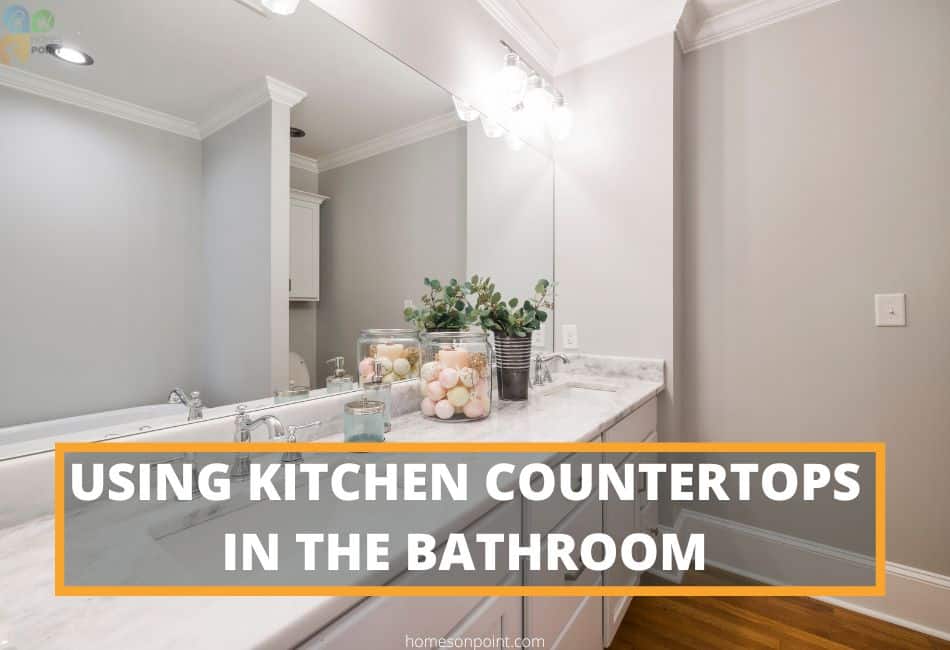When it comes to kitchen and bathroom countertops, there are a lot of similarities. Both surfaces need to be durable, easy to clean, and able to withstand a lot of wear and tear. But does that mean you can use kitchen countertops in the bathroom? Is there anything wrong with using the same material for both rooms?
This is a question a lot of people have, and there are a few things to consider before making a decision. Some people have argued this from an interior design standpoint, but there are also practical considerations to think about. Here’s a comprehensive guide on kitchen and bathroom countertops so you can make the best decision for your home.
Choosing the right countertop material is an important decision, whether you’re remodeling your kitchen or bathroom – or both. There are a lot of options on the market, and it can be overwhelming to try and narrow down your choices. Sometimes you might have a leftover piece of countertop from a previous project, and you’re wondering if you can just use that instead of buying new. Here are a few things to think about when deciding whether to use kitchen countertops in the bathroom.
What Are The Differences Between Kitchen Countertops And Bathroom Countertops?
On the surface, it might not seem like there would be many differences between kitchen and bathroom countertops. There are quite a number of similarities between the two so it is easy to understand why this question is so commonly asked. After all, both surfaces need to be durable, easy to clean, and able to withstand a lot of wear and tear. However, there are two key differences that you need to be aware of.
Size Of The Countertop:
The first difference is the size of the countertop. Kitchen countertops are usually much larger than bathroom countertops. There is a lot of activity that takes place in the kitchen, so you need a larger surface area to prep meals, wash dishes, and so on. Bathroom countertops, on the other hand, are typically much smaller. This is because there’s less activity that takes place in the bathroom, so you don’t need as much space.
Type Of Material
The next difference is the type of material. Kitchen countertops are typically made from materials that are more durable, such as granite or quartz. This is because they need to be able to withstand a lot of abuse, such as hot pans, sharp knives, and so on. Bathroom countertops, on the other hand, can be made from a wider range of materials because they don’t have to be as durable. Some popular choices for bathroom countertops include marble, soapstone, and laminate.
What To Consider When Choosing Countertops For Your Kitchen Or Bathroom?
While we can arguably use the same countertop material for both our kitchen and bathroom, it is important to think about the implications of doing so. Here are a few key points to consider:
1. Exposure To Water And Chemicals
One of the most important things to consider is the amount of water exposure that your countertop will be subject to. You also need to consider the amount of abuse that your countertop will go through.
Bathroom countertop faces a more dangerous threat than kitchen countertops. They are constantly exposed to water, steam, and other harsh chemicals. It is easy for some bathroom countertops to be stained with products like hair dye, nail polish, makeup, toothpaste, mouthwash, hygiene products, and cleaning products.
Kitchen countertops on the other hand are also at risk of wear and tear from abuses such as hot pans, sharp knives, and spills. This exposure can cause damage to certain types of countertops over time.
For this reason, it’s important to choose a countertop material that is specifically designed for bathroom use.
2. Material Type
As we mentioned earlier, bathroom countertops can be made from a wider range of materials than kitchen countertops. This is because they don’t have to be as durable. You have the liberty to choose whatever material for your kitchen and bathroom countertop but I strongly advise you to take into consideration the amount of water exposure, abuse, and wear and tear that it will be subject to.
Some materials like marble and granite are more porous than others and as a result, they are more susceptible to staining. If you choose one of these materials for your bathroom countertop, make sure to seal it properly to prevent any staining.
Soapstone is another popular choice for bathroom countertops because it is non-porous and therefore, resistant to staining. However, it is a softer material so it can be scratched more easily.
Laminate is also a popular choice because it is relatively inexpensive and comes in a wide range of colors and designs. However, it is not as durable as some of the other materials on this list and it can also be damaged by exposure to water.
Quartz is another popular choice for bathroom and kitchen countertops because it is non-porous, durable, and comes in a wide range of colors.
3. Level Of Maintenance
When choosing a material for your bathroom countertop, it’s important to consider the level of maintenance that you’re willing to do. Some materials, such as marble, require more maintenance than others. If you choose a material that requires sealing or other special care, then you need to be prepared to do that on a regular basis.
Every different material has a different level of maintenance that goes along with it. For example, marble countertops need to be sealed on a regular basis and they are also more susceptible to staining. Soapstone countertops, on the other hand, don’t need to be sealed but they can be scratched more easily.
Laminate countertops are relatively easy to maintain but they can be damaged by exposure to water. Quartz countertops are also easy to maintain and they are very durable.
No matter what material you choose for your bathroom or kitchen countertop, make sure that you understand the level of maintenance that it will require.
4. Aesthetic Consideration
You need to decide what kind of look you want and then choose a material that will complement that. For example, if you want a more classic look, then marble or granite would be a good choice. If you want a more modern look, then laminate or quartz would be a good choice.
It’s important to keep in mind that the material you choose for your countertop can also affect the overall look of your bathroom. If you have a small bathroom, then choosing a dark material for your countertop can make it look even smaller. If you have a large bathroom, then choosing a light-colored material can help to make it look even bigger.
No matter what material you choose for your bathroom countertop, make sure that you consider the overall aesthetic that you’re going for.
5. Potential Cost
The cost of your countertop will vary depending on the material that you choose. Some materials, such as marble or granite, are more expensive than others. However, they are also more durable and require less maintenance. Laminate countertops are a good choice if you’re looking for an inexpensive option. However, they are not as durable as some of the other materials on this list.
Quartz countertops are a good choice if you’re looking for a durable and low-maintenance option. However, they are more expensive than some of the other materials on this list.
Choose a material that is within your budget but also consider the long-term costs of maintenance and repairs.
Benefits Of Using Kitchen Countertops In The Bathroom?
There are potential benefits of using kitchen countertops in the bathroom. Let’s examine some of them.
1. Wide Rane Of Options
Kitchen countertops come in a wider range of colors and styles. This means that you’re more likely to find a style that suits your taste. You are not limited to the colors and styles typically found in bathroom countertops.
Additionally, kitchen countertops are often made from a wider range of materials. This means that you can find a material that is both durable and stylish for your bathroom.
2. It Reflects Your Preference
By using kitchen countertops in the bathroom, you can reflect your unique style and personality. This is because you’re not limited to the typical colors and styles found in bathroom countertops. You can find a style that suits your taste and personality.
3. Maintain Consistency In Your Kitchen And Bathroom
If you’re looking to maintain consistency between your kitchen and bathroom, using the same countertops is a great way to do so. This can give your home a cohesive look and feel.
4. Prevents Wastage
Another potential benefit of using kitchen countertops in the bathroom is that it prevents wastage. When you have leftover countertop material from your kitchen renovation, you can use it in your bathroom instead of throwing it away. This can save you money and help to reduce waste.
Final Thoughts
So, can you use kitchen countertops in the bathroom? The answer is yes you can but there is very little reason to do so. The only potential benefits are that you have a wider range of options and it reflects your preference. The kitchen and bathroom are exposed to different humidity, water, and chemical conditions. Because of this, it is important to choose countertops that are specifically designed for the bathroom. Thanks for reading.

